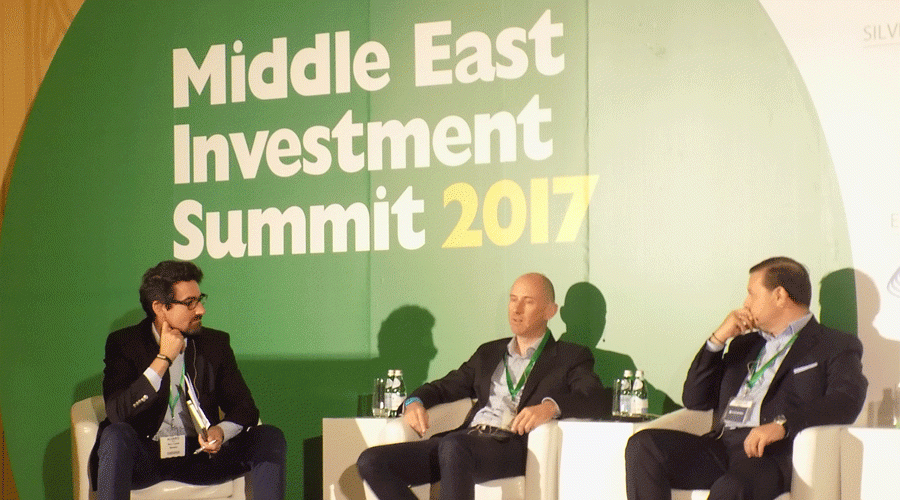Middle East Investment Summit explores MENA's VC trends

With the largest B round funding in the history of the Middle East tech ecosystem (41 million dollars for Fetchr) and Amazon’s historic acquisition of Souq and Payfort which happened during the last 60 days, investment in MENA startups will likely be a hot topic this summer. Considering the statistics about the influx of capital in the MENA revealed last week in ArabNet’s latest report, regional entrepreneurs may be asking themselves: “When and how can I get my hands on some of that money?”
During the annual Middle East Investment Summit held in Dubai on May 22 and 23, analysis of this topic was presented by a panel of GCC-based investors, including a pair of VCs from firms that invested in the aforementioned Fetchr Series B last week: Christos Mastoras of Iliad Partners and Alvaro Abella of Beco Capital.
Finding reinforcements
Moderating the panel on MENA unicorns, which also featured Angus Paterson of STC Ventures and Iris Capital, Abella spoke about an issue that many startup founders face: finding reinforcements when the early cash starts to run thin. “In the early stage, you have entrepreneurs who have a plethora of opportunities (for seed capital sources) having access to various deep-pocketed individuals in the region,” said Abella before discussing the challenge of finding funds for later rounds. According to Mastoras, teamwork between local and international players can help startups in the MENA region scale sustainably.
“The name of the game is co-investment and collaboration between regional MENA VCs and global ones. It is to the benefit of entrepreneurs and of investors to have more smart people around the table,” said Mastoras, who also highlighted the need to support regional entrepreneurs early on as they strive to grow. “More LP (Limited Partners) investors need to allocate more capital into the MENA's regional VC funds. Data shows that there is still a gap in regional VC funding. One of the bottlenecks to further growth is the accelerating funding requirements of strong startups across all funding stages which is not fulfilled regionally,” said Mastoras.
Mastoras pointed out that he believes what has taken place so far is just the tip of the iceberg.“We are in phase one of venture capital in the MENA, where VCs are still investing in globally-proven concepts, localized in the MENA region and executed by strong teams to scale regionally. At Iliad Partners, we call this ‘disruptive localization’,” he said.
Amjad Ahmad, managing partner of Dubai-based Precinct Partners, who had shared his insights on patient capital with Wamda earlier this year, also spoke at the summit. He echoed the rallying cry heard from Mastoras: early-stage support from regional investors is sorely needed. “We have not witnessed a dramatic change in funding startups yet as local investors continue to be skeptics rather than supporters. It is unclear whether the lack of funding for startups is linked to the overall negative economic sentiment or is specific to the risks associated to early stage investing,” said Ahmad. “It is imperative to develop strong venture and growth capital firms to efficiently and sustainably allocate capital to startups.”
Just days after @VentureSouq invested in the largest Series B in MENA #startup history (@Fetchr), @suneelgokhale speaks at @MEISdxb #MEIS. pic.twitter.com/B2yMuyWei0
— Elías Kamal Jabbe (@Elias213) May 23, 2017
Environmental investments
Another highlight of the Middle East Investment Summit involved an overview of investments made by regional and international universities. Nicola Bettio, director of the Innovation Fund at the King Abdullah University of Science and Technology (KAUST), presented a look at the portfolio of his university’s investments and counterparts around the world. KAUST’s investments, along with other initiatives like funding scholarships for Saudi students who have studied at universities abroad and later created startups at home, exemplify the Saudi government’s efforts to diversity its economy. “At KAUST, we have two funds. One is the Innovation Fund, which is focused on seed and early stage startups involved in KAUST’s main research areas. The second is the Beacon Fund launched in partnership with ICD (part the Islamic Development Bank Group), which invests in energy and cleantech startups that are at small and medium-early stages,” said Bettio.
Adding that 30 percent of KAUST students were Saudi nationals, he highlighted his fund’s focus on supporting startups that are addressing local environmental issues. These included those right on KAUST’s doorstep in Thuwal, which is located close to Jeddah on the coast of the Red Sea. He said that KAUST is conducting research to preserve the coral reefs in the Red Sea and to identify from such research potential solutions for global warming.


